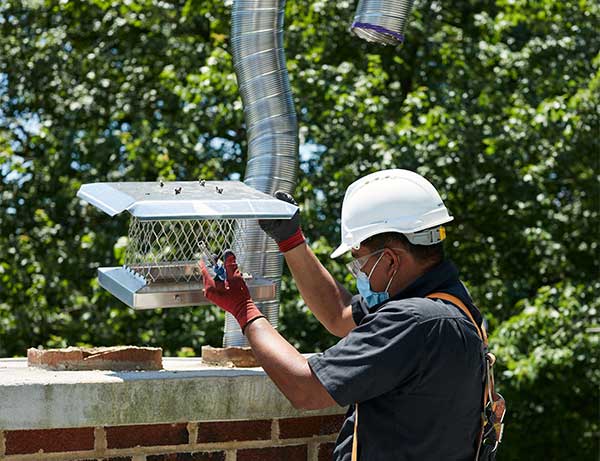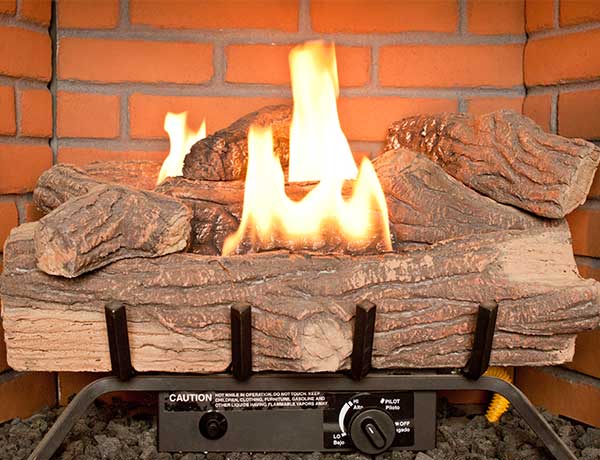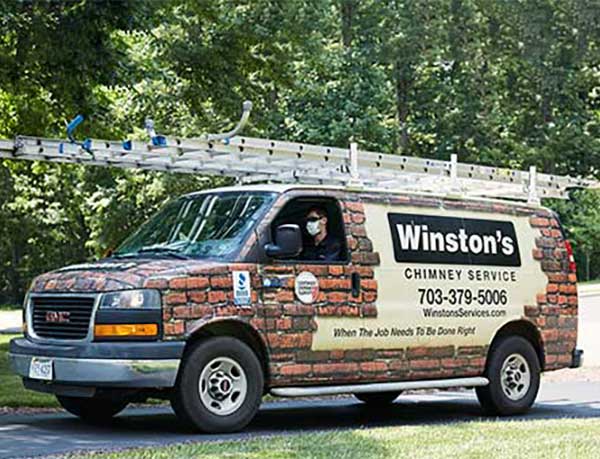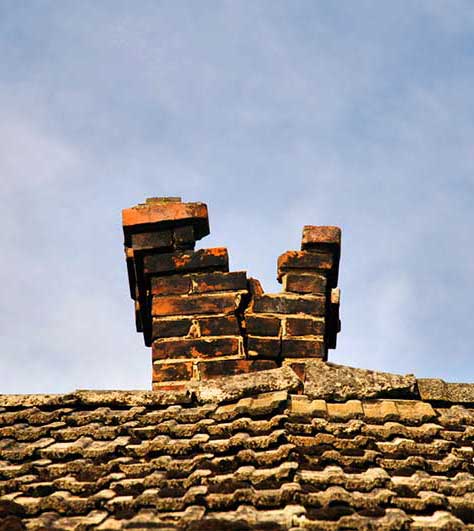Chimney Waterproofing & Repellent: The Ultimate Protection for Your Home from Water Damage
Keeping your chimney properly maintained is essential for ensuring a safer living environment. And a common issue that can arise with a neglected chimney is water intrusion – meaning rain, snow, sleet, and ice have easy access and can cause costly damages throughout the year.
Right away, these infiltrations can trigger rust to form on metal components and deterioration across your masonry. Then, over time, seepage can lead to issues like staining on interior walls and watermarks on ceilings – and might even create a favorable breeding ground for mold spores.
Thankfully, there are many proactive steps Winston’s Chimney Service can help you with to prevent leak-related damages from ever happening in the first place. From specialized flue caps and liners to waterproofing and repellent treatments, we’ve got solutions for it all.
Is Chimney Water Repellent & Chimney Waterproofing the Same Thing?
Water repellent and chimney waterproofing may seem like the same thing, but they are actually two very different strategies.
Chimney water repellent consists of a chemical treatment that is applied to masonry surfaces, which then causes surface water on the brickwork to bead up and roll off. And because brickwork also needs to breathe, the agent is vapor-permeable. This way, the masonry can wick away internal water vapors while still maintaining its ability to vent.
Chimney waterproofing, on the other hand, involves coating and sealing the top areas of the chimney structure with either a silicone-based or acrylic-based material solution. It’s applied mainly at the crown – and it’s particularly beneficial if the crown is already showing signs of damage or cracking.
While both processes can protect your chimney from rain and water-related damage, they each have unique benefits, depending on your needs.
If your goal is simply to prevent minor moisture accumulation on the outside of your chimney, water repellent may be adequate.
If you’re worried about interior seepage caused by an aging or partially damaged crown, though, then waterproofing should be considered for maximum protection on that section of your chimney.
All that said, usually, in order to protect the entire chimney structure, you will need both chimney water repellent and waterproofing services.
How Do I Tell if My Chimney Needs Waterproofing?
If you own a home with a chimney, it’s essential to have it professionally inspected every year for signs of damage or wear that could lead to issues in function and safety. And while some repairs can be noticed easily, others, like whether your chimney needs waterproofing or not, may not be so obvious.
Your sweep will need to check the top of the chimney where the crown layer protects the rest of the system from water intrusion, as well as where the flue ejects smoke and soot.
But what can you watch for, as a homeowner?
- Take a look inside the firebox at the bricks and mortar. If there are any crumbling and worn patches, that’s a sure sign there’s moisture present.
- If you see any evidence of water when you open and close the damper, then it’s time to get a chimney inspection completed to verify water intrusion one way or the other.
- Check for rust on any metal components, like the chimney cap or chase cover.
- If water is pooling anywhere in the chimney or fireplace – like in the firebox – this is a clear sign that your system is vulnerable to leaks and damage.
If left untreated, these issues can escalate into major problems in your home or on your roof, such as rust, wood rot, or mold growth. Water is not something to leave unattended, when it comes to your chimney and fireplace.
How Do I Tell If My Chimney Needs Chimney Water Repellent?
One telltale sign that water repellent is needed is large amounts of white staining around the chimney bricks. This white powdery substance indicates water is seeping through the mortar joints and brickwork, thus stressing the masonry materials and causing salt to form due to hydronic pressure.
Other signs that chimney water repellent may be necessary include crumbling or spalling bricks and flaking or missing mortar. In addition, keep an eye open for staining or peeling paint on your walls – both are good indicators that it’s time to bring in professional chimney specialists for some repair services and preventive maintenance.
Does Waterproofing a Chimney Work?
Yes – depending on the condition of the chimney, waterproofing either alone or in combination with chimney water repellent can provide additional protection against strong winds, driving rain, and snow packs.
How does it work? Properly applied waterproof masonry sealants are worked into cracks and crevices in masonry crowns and can help prevent most water infiltration from the top of the system.
However, it’s not a magic bullet solution. Applying waterproof coatings without improving drainage around the chimney can actually cause more damage in some situations – and it’s why hiring trained chimney technicians from Winston’s Chimney Service is such a must. In the end, getting this done correctly the first time is essential, and it’ll save you lots of stress, time, and expense down the line.
Is Using a Vapor-Permeable Waterproofing Sealant Important?
If you have a chimney made of bricks or stone, then yes – you should seriously consider putting in a water repellent application to protect these materials. That said, investing in something that’s vapor-permeable is vital.
The reason you don’t want to apply a true waterproofing sealer (or one that isn’t vapor-permeable) has to do with the way bricks work. Most people don’t realize that bricks are extremely porous and act like a sponge – which is what makes a waterproofing treatment sound like the thing to do. However, on the ventilation side, that same brick allows the chimney and venting system to breathe, which actually helps it function properly.
A proper chimney water repellent agent is vapor-permeable, so that masonry can wick away internal water vapor thus repelling the water while keeping the permeability intact. If this isn’t the case, it can lead to moisture buildup that damages the flue liner and other parts of the chimney structure from the inside out.
It is recommended to have a certified chimney technician inspect your home’s chimney at least once a year so that, if this application is needed, it can be done correctly and with the best industry-grade products available. By taking preventive measures for your brick or stone chimney now, you will be ensuring its longevity for many years to come.
How Much Does It Cost to Waterproof a Chimney?
So, you get it – waterproofing your chimney is an important investment. Now… how much is it going to cost? Unfortunately, we don’t have a cut and dry answer. To determine how much it will cost to waterproof and add water repellent to your chimney, there are several factors that should be taken into consideration.
First, you’ll want to ensure the job is done correctly, which means hiring a professional sweep who is properly certified. Your techs will thoroughly inspect the chimney structure to determine factors like accessibility, the height of the chimney, the type of sealant required, and the area size, all of which influence the labor involved and what your overall costs might look like.
The other thing your sweep will consider is if any repairs are needed before the application of these treatments. Because of these factors, it’s hard to give out a ballpark figure.
However, if you call the office of Winston’s Chimney Service, we can send someone out to look things over, then give you an estimate for your particular chimney structure. Reach out at 703-379-5006 or book online with us today.
What Type of Damage Can Happen if I Choose Not to Waterproof My Chimney?
If you live in a region that receives rain or snow, like here in Northern VA, not waterproofing your chimney crown and protecting your brick with water repellent can cause significant damage to both the exterior and interior of your chimney.
Exterior damage can consist of chipping brickwork and flaking mortar. And poorly maintained masonry work can lead to structural instability, which is an even more serious problem. Applying a water repellent on the outer brick surfaces keeps water at bay and from seeping deep into the brick’s structure where it can be easily damaged by freeze-thaw cycles.
Inside the chimney, unseen damage such as weakened or corroded structural materials can make the chimney unsafe for use. Furthermore, water damage within your chimney may cause it to become blocked off due to buildup of soot and tar – which could invite some serious damages down the line.
By waterproofing your chimney crown and monitoring its condition, you can anticipate potential issues before they become larger problems – and ensure that your system stays intact for the long haul.
Why Is It Important to Keep Water Away From Bricks?
Water damage is a serious issue when it comes to bricks and mortar. The porous nature of brick materials makes them extra vulnerable and can lead to major problems, such as weakening and cracking, later on down the line.
In conditions where there are a lot of temperature variations – where it’s above, then below freezing multiple times a day – more serious problems can occur. If water gets trapped inside the brick, then it will freeze and expand when temps drop. This breaks the brick structure from the inside out, inviting cracks and deterioration.
In addition, if water puddles against the sides of porous bricks, it can invite mold growth in both the interior and exterior walls. Therefore, it’s essential to keep water away from brick to prevent such issues from occurring and to maintain its strength and durability over time.
Proper drainage systems, applying a good chimney water repellent, and the maintenance of gutters and downspouts around the home are some of the best ways to maintain a drier and stronger brick system.
How Often Should You Have Your Chimney Waterproofed or Treated With Repellent?
The frequency with which a homeowner should have their chimney waterproofed and/or treated with water repellent depends on many contributing factors, such as the climate, the type of material used in the chimney’s construction, and how often the fireplace is used. In many cases, a waterproofing or sealing treatment should be applied to the chimney crown every 5 to 7 years to help ensure it is protected from water damage caused by rain or snow.
Additionally, a high-grade masonry water-repellent treatment applied by a professional has a 10-year warranty for vertical surfaces. Just be sure to trust a certified chimney technician through it all to ensure any necessary repairs are made before the application is made – and to keep the warranty valid.
While this might seem to be overkill for the chimney structure, both of these treatments are inexpensive compared to more costly repairs that may result from inadequate maintenance – and can save you considerable amounts of money in the long run.
Who Offers Waterproofing & Brick Water Repellent in Northern Virginia, Washington, DC & Maryland?
If you live in Northern Virginia, Washington, DC, or Maryland, Winston’s Chimney Service is the best of the best. We’ve been serving our community for over 45 years, all of our chimney sweeps are certified by the Chimney Safety Institute of America (CSIA), and we go through year-round training to stay on top of our game.
We understand you want the best service and that’s what we bring to your door. Check out our reviews and let us show you what we can do for your chimney. Call Winston’s at 703-379-5006 or reach out online to schedule your appointment today.
Chimney caps and dampers can help keep your system drier and free of debris, meaning you aren’t likely to need masonry repairs as often.




